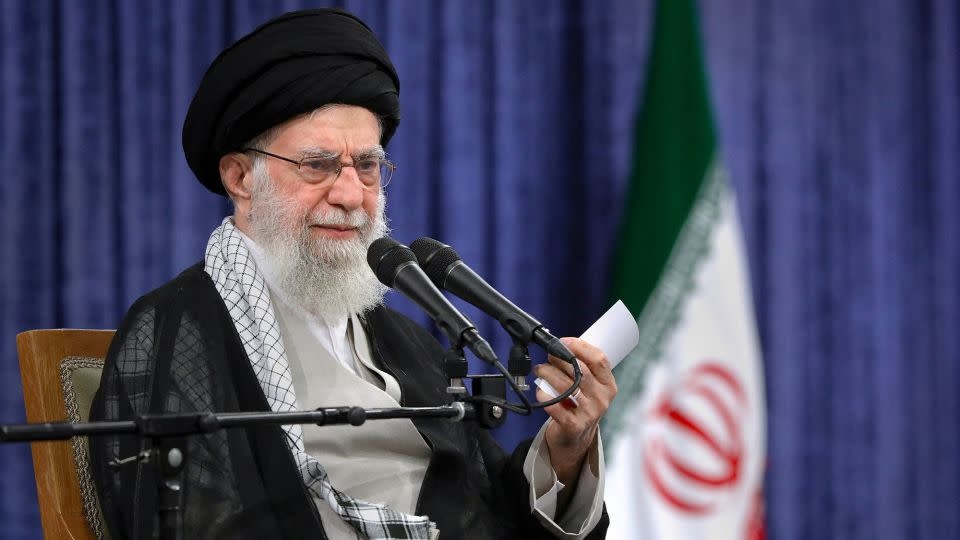Iranian Supreme Leader Ayatollah Ali Khamenei on Wednesday, June 4, 2025, firmly stated that Iran will not abandon its uranium enrichment program, rejecting a critical component of a U.S. proposal.
According to mediaa reports, the proposal is aimed at resolving the prolonged dispute over Iran’s nuclear activities.
Khamenei’s remarks came during a speech on Wednesday, delivered at a ceremony commemorating the death of Ayatollah Ruhollah Khomeini, the founder of the Islamic Republic.
His comments underscore the enduring deadlock between Washington and Tehran.
This comes as both sides continue to discuss the possibility of a renewed nuclear agreement.
The U.S. has reportedly suggested that Iran either completely halt or significantly reduce its uranium enrichment activities in return for the removal of Western sanctions.
However, Khamenei criticized this proposal as fundamentally incompatible with Iran’s core values and aspirations.
He described the U.S. offer as a violation of the nation’s principle of self-reliance and Iran’s revolutionary motto of “We Can.”
According to Khamenei, uranium enrichment is central to Iran’s vision of energy and technological independence.
Also, he warned that any move to dismantle this capability would compromise the country’s sovereignty.
“True independence means not waiting for permission from America or its allies,” Khamenei asserted, adding that the American proposal stands in direct contradiction to the ideals of the 1979 Islamic Revolution.
He reiterated that Iran would not seek U.S. approval for its decisions
Khamenei also condemned any mindset that equates rational policy with yielding to American pressure.
“Some people believe that being rational is about surrendering to the power of America.
That’s not rationality,” he said. He also challenged the U.S. position, questioning its authority to dictate whether Iran should engage in uranium enrichment.
“Why are you interfering in Iran’s right to enrichment? You have no right to decide,” he added.
Supporting Khamenei’s stance, Iranian President Masoud Pezeshkian echoed the leadership’s firm position on Tuesday.
Pezeshkian affirmed that Iran would not relinquish its scientific and nuclear achievements, while also distancing the country from the pursuit of nuclear weapons.
He criticized those who accuse Iran of weaponization, pointing out that many of these same countries possess weapons of mass destruction.
Pezeshkian also pointed out that these countries are contributing to instability in the region through the spread of advanced arms.
Adding to the tension, a recent report by Reuters revealed that Iran is likely to reject the latest U.S. proposal.
Quoting an unnamed diplomat, the report described the offer as a “non-starter” that neither adjusts the U.S. stance on enrichment nor addresses Iran’s key concerns.
The proposal reportedly fails to accommodate Tehran’s position that its nuclear program is intended solely for peaceful purposes.
Iran has consistently denied allegations from Western powers that it is pursuing a nuclear weapon.
It insists instead that its aim is to master nuclear technology for civilian energy and medical applications.
The situation has been further complicated by recent findings from the International Atomic Energy Agency (IAEA).
A leaked U.N. report indicates that Iran has increased its production of enriched uranium near weapons-grade levels by 50 percent over the past three months.
While the enrichment levels still fall short of the 90 percent threshold typically needed for nuclear weapons, they far exceed the 3-4 percent typically used in civilian energy production.
Iran, however, dismissed the IAEA report as politically motivated, stating that it repeats unfounded accusations.
Meanwhile, U.S. envoy Steve Witkoff, who leads the American delegation in talks with Tehran, emphasized that President Donald Trump considers any level of Iranian enrichment unacceptable, calling it a “red line.”
This uncompromising stance from Washington appears to leave little room for compromise on the issue.
Iran is currently dealing with a series of internal and external pressures.
Domestically, the country faces economic turmoil, including a devaluing currency.
Regionally, it is grappling with losses among its allied militias in confrontations with Israel and growing fears of a potential Israeli strike on its nuclear infrastructure.
Without a new nuclear agreement, the already volatile situation in the Middle East, particularly amid ongoing conflict in Gaza, could deteriorate further.
The failure to reach a diplomatic resolution risks escalating tensions and destabilizing an already fragile region.







